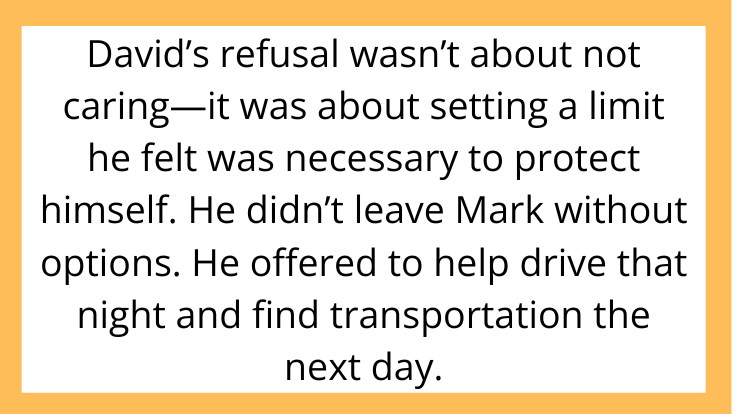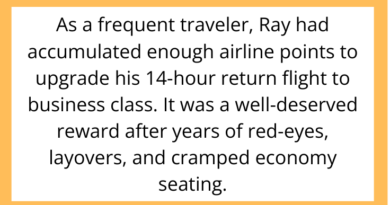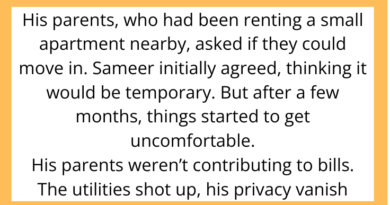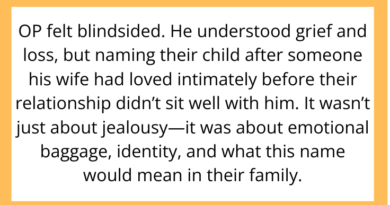AITAH for Refusing to Lend My Car to My Best Friend Even Though She Needed It for a Family Emergency?
When your best friend calls you in a panic, your first instinct is usually to help. But what happens when helping crosses your own boundaries? Today’s AITAH scenario dives into a tense situation between two lifelong friends whose trust and expectations didn’t quite line up.
Let’s unpack the drama to see who, if anyone, is actually the villain here.
The Story: A Desperate Call and an Uncomfortable Request

The original poster—let’s call him David—shared his dilemma on Reddit’s r/AITAH community. David owns a relatively new car that he worked hard to buy after years of saving. He lives in a suburban area where having a reliable vehicle is essential to get to work and run errands.
One evening, David received a frantic call from his best friend, Mark. Mark explained that his mother had fallen ill suddenly and needed to be driven to the hospital. Mark doesn’t own a car and was asking to borrow David’s overnight so he could take his mom to and from appointments the next day.
David felt conflicted. On one hand, he empathized with Mark’s situation. On the other, Mark has a track record of being careless with borrowed items—he’s returned things damaged or late more than once. David was also worried about insurance, liability, and what would happen if there was an accident.
After considering the risks, David apologized and told Mark he couldn’t lend out the car. He offered to drive them to the hospital that night and help call a rideshare for the next day, but Mark hung up on him. The next morning, Mark sent a string of angry texts accusing David of valuing a “piece of metal” over a human life and ending their friendship.
David turned to Reddit to ask: AITAH for refusing to lend my car, even in an emergency?
The Case for David: Reasonable Boundaries

Many in the AITAH community quickly came to David’s defense.
Lending a Car Is a Huge Responsibility
-
Legal and Financial Risk: If Mark had an accident, David’s insurance rates could skyrocket—or the policy might not cover the damages.
-
Prior History: Mark had shown he wasn’t reliable with borrowed property.
-
Personal Comfort: Just because you’re friends doesn’t mean you have to risk your own stability.
As one commenter wrote:
“Lending a car isn’t like lending a cup of sugar. If something goes wrong, you’re on the hook. Offering to help in other ways was the right move.”
The Case for Mark: Desperate Circumstances

But not everyone sided with David. Some pointed out that this was a genuine emergency—a mother’s health crisis.
-
Urgency: Mark may have felt he had no other options in that moment.
-
Trust and Friendship: To him, David’s refusal might have felt like a lack of loyalty or compassion.
-
Emotional Response: When someone you love is in danger, it’s hard to think rationally about logistics or liability.
Still, even commenters who sympathized with Mark agreed that hanging up and ending the friendship was an extreme reaction.
Boundaries vs. Obligation: Where Do You Draw the Line?

This story highlights an uncomfortable truth: not all requests are reasonable, even in emergencies.
David’s refusal wasn’t about not caring—it was about setting a limit he felt was necessary to protect himself. He didn’t leave Mark without options. He offered to help drive that night and find transportation the next day.
Mark, on the other hand, saw the refusal as a betrayal. It’s possible he equated friendship with unquestioning sacrifice, which can be an unfair expectation to place on anyone.
When Helping Hurts More Than It Helps

Many people feel guilt when they say no, especially to someone in crisis. But agreeing to something that makes you deeply uncomfortable can damage the relationship in the long run. If David had lent the car and something had gone wrong, the fallout could have been even worse.
Friendship requires empathy—but also respect for each other’s boundaries.
What Could They Have Done Differently?

For David:
-
Stay calm and compassionate while holding the boundary.
-
Emphasize that the refusal wasn’t personal, but about liability.
-
Offer multiple alternatives to show willingness to help.
For Mark:
-
Understand that borrowing a car is a big ask, no matter the situation.
-
Accept other forms of support without resentment.
-
Avoid ultimatums that could permanently damage the friendship.
The Takeaway: Saying No Doesn’t Make You the Villain

This AITAH scenario is a reminder that healthy relationships include respecting each other’s limits. Emergencies don’t erase personal boundaries—and setting them doesn’t mean you don’t care.
David’s decision wasn’t malicious or selfish. It was cautious, considered, and paired with offers of help in safer ways.



